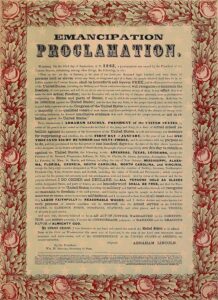 The Civil War was fought for a number of reasons, but the biggest reason was the slave issue. During the war between the North and South, came President Lincoln’s Emancipation Proclamation on January 1, 1863, and the freedom of the slaves…well, most of them, anyway. Of course, things like this come in stages. The Proclamation had the effect of “changing the legal status of more than 3.5 million enslaved African Americans in the secessionist Confederate states from enslaved to free. As soon as slaves escaped the control of their enslavers, either by fleeing to Union lines or through the advance of federal troops, they were permanently free. In addition, the Proclamation allowed for former slaves to ‘be received into the armed service of the
The Civil War was fought for a number of reasons, but the biggest reason was the slave issue. During the war between the North and South, came President Lincoln’s Emancipation Proclamation on January 1, 1863, and the freedom of the slaves…well, most of them, anyway. Of course, things like this come in stages. The Proclamation had the effect of “changing the legal status of more than 3.5 million enslaved African Americans in the secessionist Confederate states from enslaved to free. As soon as slaves escaped the control of their enslavers, either by fleeing to Union lines or through the advance of federal troops, they were permanently free. In addition, the Proclamation allowed for former slaves to ‘be received into the armed service of the  United States.’ The Emancipation Proclamation played a significant part in the end of slavery in the United States.”
United States.’ The Emancipation Proclamation played a significant part in the end of slavery in the United States.”
This all seemed simple enough, if the slave could escape, but they had to know about the Emancipation Proclamation, and the slaveowners in Texas decided not to tell them that they could be free. The Proclamation had the effect of changing the legal status of more than 3.5 million enslaved African Americans in the secessionist Confederate states from enslaved to free. As soon as slaves escaped the control of their enslavers, either by fleeing to Union lines or through the advance of federal troops, they were permanently free. In addition, the Proclamation allowed for former slaves to “be received into the armed service of the United States.” The people of Texas kept their slaves in the dark about everything, including the end of the Civil War Major General Gordon Granger, who had been tasked with enforcing the Emancipation Proclamation. Granger arrived in Galveston until June 19, 1865, where he formally announced that the slaves were free according to  General Order Number 3. It was the first time many of them had heard this good news. Texans began celebrating June 19th as Juneteenth since that time. It became a state holiday in 1979.
General Order Number 3. It was the first time many of them had heard this good news. Texans began celebrating June 19th as Juneteenth since that time. It became a state holiday in 1979.
On April 8, 1864, by the necessary two-thirds vote, the Senate passed the 13th Amendment. The House of Representatives passed it on January 31, 1865, and the required three-fourths of the states ratified it on December 6, 1865. The amendment made slavery and involuntary servitude unconstitutional, “except as a punishment for a crime.”


Leave a Reply